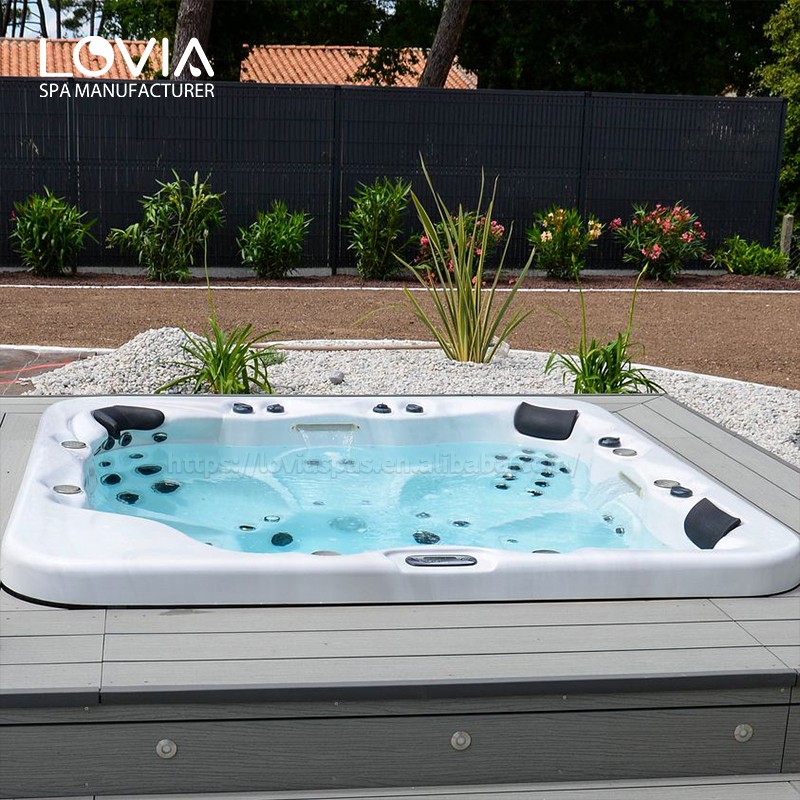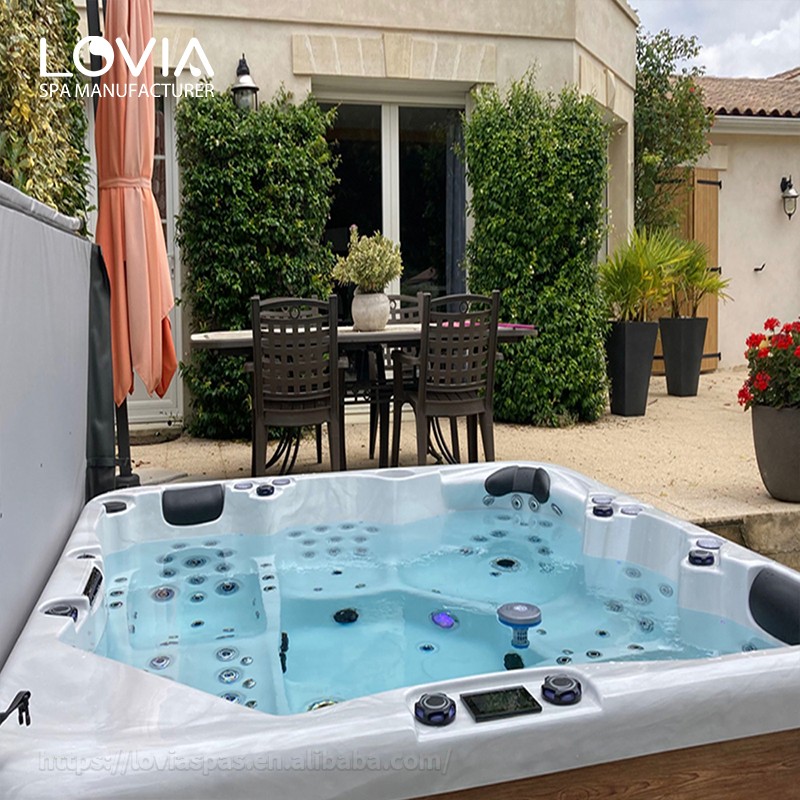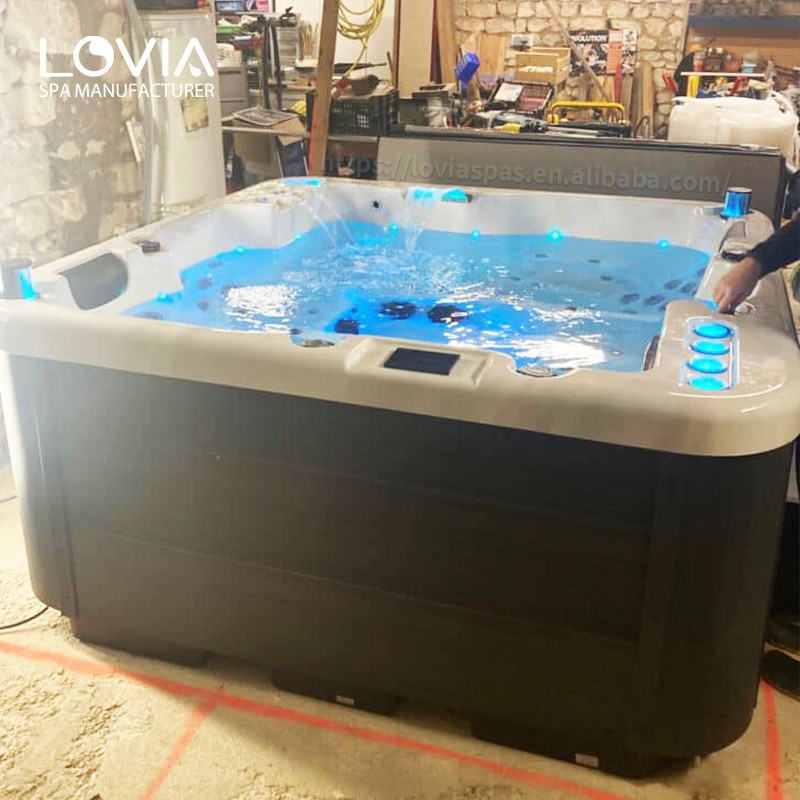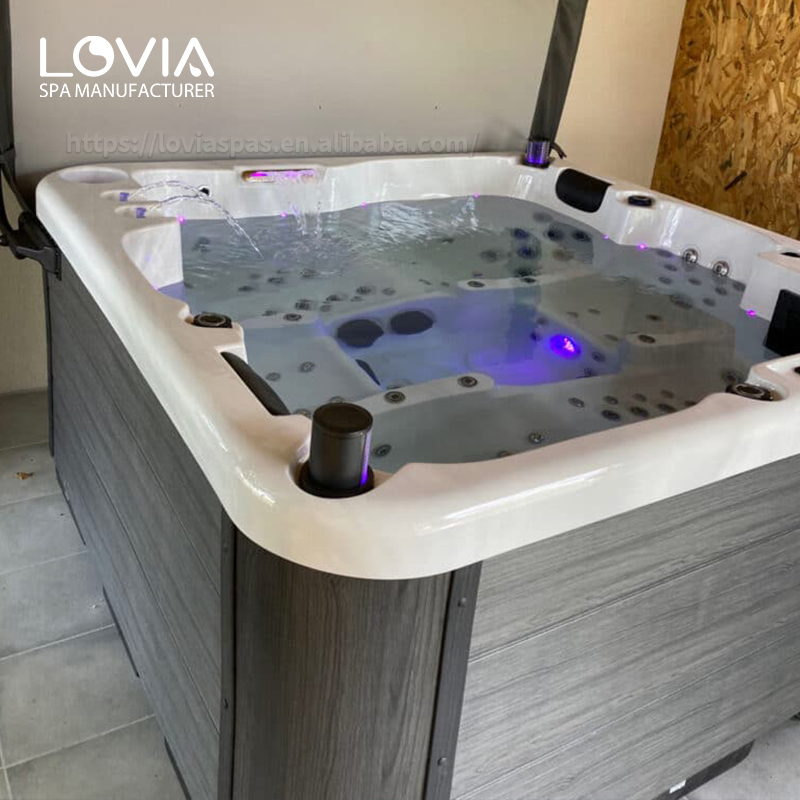
Varför är klortestresultatet i mitt bubbelbadkar utomhus felaktigt?
2025-02-06 15:35För att säkerställa korrekta klortestresultat kan användare vidta följande åtgärder:● Kalibrera utrustning regelbundet: Oavsett om det är ett testkit eller ett elektroniskt testinstrument, bör det kalibreras regelbundet för att säkerställa dess noggrannhet och tillförlitlighet. För elektronisk utrustning är rengöring och underhåll av sensorer, kalibrering av elektroder etc. viktiga steg för att säkerställa mätnoggrannhet.● Var uppmärksam på störningsfaktorer i vattenkvaliteten: Försök att undvika störningar från organiskt material, mineraler och andra föroreningar i vattnet när du detekterar klor. Om det finns för många föroreningar i vattnet är det bäst att filtrera eller rengöra det först för att minska påverkan av störningar på testresultaten.
● Justera vattnets pH-värde: Genom att justera vattnets pH-värde för att hålla det inom ett lämpligt intervall (vanligtvis 7,2 till 7,8), hjälper det klorets stabilitet och desinfektionseffekt. Kontrollera samtidigt pH-värdet regelbundet för att säkerställa att det inte avviker från normalområdet.

● Standardisera driftprocessen: Följ strikt testmetoderna och stegen för att säkerställa att provtagning, reagenstillsats, reaktionstid och andra länkar uppfyller kraven. För kitmetoden, se till att färgkortet är klart, reagenserna är färska och jämför färgskillnaderna korrekt.
● Håll vattenpumpen och filtreringssystemet i gott skick: En bra vattenpump och filtreringssystem kan effektivt ta bort föroreningar i vattnet, minska förbrukningen av klorkoncentration av föroreningar och säkerställa desinfektionseffekten av klor.
Letar du efter en pålitlig spatillverkare?
Guangzhou HuanTong Industrial har varit en nyckelaktör på marknaden för friluftsprodukter i över 30 år. Vi erbjuder hög kvalitet,
anpassningsbara spa

, inklusive badspa, utomhusjacuzzi och mer. Vår fabriksbaserade verksamhet tillåter oss att erbjuda konkurrenskraftiga priser och specialerbjudanden, vilket gör det enkelt för företag att köpa högkvalitativa produkter till överkomliga priser. Med certifieringar som CE, ETL och ISO9001 kan du lita på att vi levererar överlägsen kvalitet och prestanda. Kontakta oss idag för att fråga om våra grossistalternativ och exklusiva erbjudanden.
The problem of inaccurate chlorine detection may be caused by multiple factors. Below we will analyze from multiple dimensions such as water quality factors, detection equipment, and usage methods to explore the reasons that may lead to deviations in test results.
1. Interference from impurities in water
Impurities in water are one of the common reasons for inaccurate chlorine test results. The water in the whirlpool bathtub contains not only chlorine, but also a variety of other substances, including organic matter, minerals, dissolved gases, and pollutants from the human body. These substances may react with chlorine or interfere with the reagents, resulting in inaccurate test results.
● Interference from organic matter: If the water contains a high concentration of organic matter (such as skin oil, cosmetic residue, body secretions, etc.), they may react with chlorine and consume chlorine, resulting in a low chlorine test value. Even if the actual chlorine concentration is high, the test result may show insufficient.
● Influence of minerals and dissolved gases: Minerals (such as calcium, magnesium, etc.) and dissolved gases (such as carbon dioxide, oxygen, etc.) in the water may also react with chlorine and affect the measurement results. Especially in hard water areas, the concentration of minerals in the water is high, which can easily cause chlorine to combine or precipitate, resulting in low test values.
● The presence of wastewater or bacteria: Pollutants such as wastewater, bacteria or algae in the whirlpool bathtub can also interfere with chlorine detection. If the water quality is not cleaned for a long time, the growth of bacteria or algae may consume chlorine, resulting in a decrease in the test value. In addition, some bacteria may generate anti-chloride, making it impossible for chlorine to react accurately.
2. Accuracy and quality issues of testing equipment
Inaccurate chlorine test results sometimes stem from the accuracy and quality issues of the testing equipment itself. Both test kits and electronic instruments have their limitations and scope of use. If the equipment fails or the accuracy is not high enough, it may cause deviations in the test results.
● Limitations of the test kit method: Although the test kit method is easy to operate, its results rely on the judgment of color changes and are greatly affected by subjective factors. The quality difference of the reagent itself, unclear color cards, and improper operation (such as inaccurate reagent dosage, uneven mixing, etc.) may all lead to errors. In addition, expired or improperly stored reagents may affect their reaction effect, thereby affecting the test results.
● Maintenance issues of electronic instruments: Electronic testing instruments usually use precision components such as sensors and photometers. If these components are not cleaned for a long time or are not properly calibrated, they are also prone to measurement errors. Especially the electrode part of the electronic instrument, if used improperly or not cleaned for a long time, may cause incomplete electrochemical reaction of chlorine, thus affecting the accuracy of detection.
3. Operational error of detection method
Even under the same equipment, different operation methods will have a great impact on the chlorine detection results. Improper operation, improper sample collection, unsuitable experimental environment and other factors will lead to errors in measurement results.
● Improper sample collection: If the water sample is not fully stirred or the sampling is uneven, the chlorine concentration of water samples in some areas may be higher than that in other areas, resulting in inaccurate test values. In addition, failure to avoid contact with the outside air during sampling may also cause chlorine to escape, thus affecting the results.
● Interference from environmental factors: The temperature, humidity and chemical composition of the environment may also affect the detection of chlorine. For example, in a high temperature environment, chlorine evaporates faster, resulting in changes in the chlorine concentration in the water sample. If the test is carried out in hot weather, the test results may be low.
● Improper operation: For example, when using a test kit, if the amount of reagent added is inaccurate, or the reagent reaction time is too short or too long, it will affect the measurement results. Similarly, when using electronic instruments, if they are not calibrated regularly according to the instructions, the accuracy of the instrument will also decrease, affecting the accuracy of the test results.
4. The impact of the pH value of the water body on the test
The pH value in the water has a significant impact on the test results of chlorine. The chemical form of chlorine in water is greatly affected by the acidity and alkalinity of the water body. At different pH values, the existence form of chlorine will change, which may lead to inaccurate test values.
● Low pH environment: When the pH value of water is low (that is, the water is acidic), chlorine mainly exists in the form of free chlorine (Cl₂) and hypochlorous acid (HOCl). These forms of chlorine are more reactive, so their disinfection effect is stronger and they will show higher concentrations when tested.
● High pH environment: In an environment with a high pH value, chlorine mainly exists in the form of hypochlorite (OCl⁻). This form of chlorine is less reactive and has a weaker disinfection effect, and the test results usually show lower concentrations. Therefore, pH control is crucial for chlorine test results.
5. Changes in chlorine concentration
Chlorine concentration is a dynamic process, which is affected by many factors such as water temperature, usage, and water quality changes. If the water quality is unstable, the chlorine concentration may fluctuate, resulting in inaccurate test results. For example, frequent water temperature changes or external pollution sources may cause the chlorine concentration to drop sharply, thus affecting the test.

How to improve the accuracy of chlorine detection?
To ensure accurate chlorine test results, users can take the following measures:
● Regularly calibrate equipment: Whether it is a test kit or an electronic test instrument, it should be calibrated regularly to ensure its accuracy and reliability. For electronic equipment, cleaning and maintaining sensors, calibrating electrodes, etc. are key steps to ensure measurement accuracy.
● Pay attention to interference factors in water quality: When conducting chlorine detection, try to avoid interference from organic matter, minerals, and other impurities in the water. If there are too many impurities in the water, it is best to filter or clean it first to reduce the impact of interference on the test results.
● Adjust the pH value of the water: By adjusting the pH value of the water to keep it in an appropriate range (usually 7.2 to 7.8), it helps the stability and disinfection effect of chlorine. At the same time, check the pH value regularly to ensure that it does not deviate from the normal range.
● Standardize the operation process: Strictly follow the test methods and steps to ensure that the sampling, reagent addition, reaction time and other links meet the requirements. For the kit method, ensure that the color card is clear, the reagents are fresh, and accurately compare the color differences.
● Keep the water pump and filtration system in good condition: A good water pump and filtration system can effectively remove impurities in the water, reduce the consumption of chlorine concentration by pollutants, and ensure the disinfection effect of chlorine.

Looking for a reliable spa manufacturer?
Guangzhou HuanTong Industrial has been a key player in the outdoor wellness product market for over 30 years. We offer high-quality, customizable spas, including swim spas, outdoor Jacuzzis, and more. Our factory-based operation allows us to provide competitive prices and special promotions, making it easy for businesses to buy high-quality products at affordable rates. With certifications like CE, ETL, and ISO9001, you can trust us to deliver superior quality and performance. Contact us today to inquire about our wholesale options and exclusive deals.
Hur kan man förbättra noggrannheten för klordetektion?